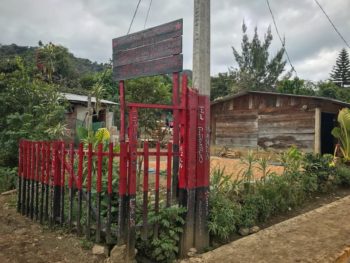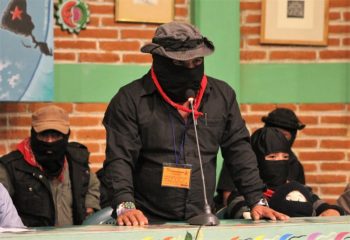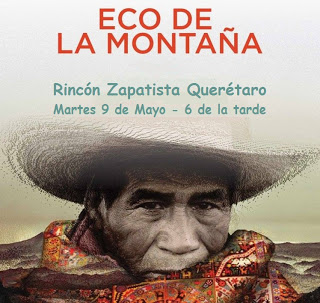
comunidades zapatistas
Message from the Zapatista Army for National Liberation on the 100th Anniversary of the Assassination of General Emiliano Zapata
ZAPATISTA ARMY OF NATIONAL LIBERATION
MEXICO
April 2019
To the family and friends of Samir Flores Soberanes:
To the Assembly of the Amilcingo Resistance:
To the Morelos-Puebla-Tlaxcala People’s Front in Defense of the Land and Water:
To the National Indigenous Congress:
To the Indigenous Governing Council:
To the National and International Sixth:
To the CIG Support Networks and the Networks of Resistance and Rebellion:
To all those who struggle against the capitalist system:
Sisters and brothers:
Compañeros and compañeras:
This is Subcomandante Insurgente Moisés, writing you on behalf of all of the Zapatista women, men, children, and elders. It is my job, as EZLN spokesperson, to communicate our collective word.
We also send you our collective embrace from the mountains of the Mexican southeast to the dignified lands of Emiliano Zapata and his successors in struggle—like Samir Flores Soberanes, our brother and compañero in the struggle to defend life. That embrace comes from all of the Tzotzil, Chol, Tojolabal, Zoque, Mame, Mestizo, and Tzeltal Zapatista peoples. Brothers and sisters, accept this embrace from all of the Zapatistas of the EZLN as a symbol of our respect and admiration.
We aren’t able to be present there with you as we would have liked, for the simple reason that the bad government has increased its military, police, and paramilitary presence in our lands, as well as its use of spies and informants. Flyovers by military planes and helicopters and armored vehicle patrols have once again reappeared here, just as during the presidencies of Carlos Salinas de Gortari [1988-1994], of Ernesto Zedillo Ponce de León [1994-2000] (political mentor of the current president), of Vicente Fox Quesada [2000-2006] after the betrayal of the San Andrés Accords, of Felipe Calderón Hinojosa (that psychopath), and of that pompadoured thief in a suit and tie named Enrique Peña Nieto, but now with greater frequency and aggression.
Those patrols and flyovers are not monitoring the narco-trafficking routes, nor the routes of those exhausted caravans of our migrant brothers and sisters who are fleeing one unrecognized war to enter another, the latter hidden behind that yammering bully who occupies the [US] presidency. No, this death threat passes by air and by land through the indigenous communities who have decided to maintain their resistance and rebellion in defense of the land, and thus in defense of life.
(Español) Denuncia de JBG zapatista sobre violencia en el Municipio Autónomo Magdalena de la Paz y en la comunidad Santa Martha, Chiapas

Foto: Comunidad zapatista en Aldama. @Luis Aguilar (Tragameluz)
Colectivo RZ, 9 de febrero, 2019.
Hoy, 9 de febrero, se cumplen 24 años del arranque de una persecución contra integrantes del Ejército Zapatista de Liberación Nacional planificada por el entonces presidente Ernesto Zedillo y su secretario de Gobernación, Esteban Moctezuma Barragán. Aunque el gobierno se encontraba en negociaciones con el EZLN, se giraron órdenes de aprehensión y se movilizó al ejército para aniquilar a las comunidades zapatistas y encarcelar a su dirigencia. La traición de febrero fracasó, pero decenas de comunidades vivieron semanas de desplazamiento forzado y dolor. A estas violaciones siguieron años de ataques por parte de grupos paramilitares que resultaron en masacres como la de Acteal o El Bosque (Unión Progreso y Chavajeval), así como en el encarcelamiento de habitantes de comunidades en lucha.
Las caravanas civiles de observación que se movilizaron en días posteriores a la traición recopilaron testimonios sobre graves violaciones a derechos humanos. Una imagen en particular vuelve a nuestra memoria. Una comunidad zapatista en mitad de las cañadas de Chiapas. Las casas destruidas y abandonadas. Algunas personas acercándose con cautela a rendir testimonio. Una escuela a la que acudían niñas y niños zapatistas hecha jirones. El aula despedazada. Los libros rotos y orinados por soldados. Los cerdos hozando en el muladar. Moctezuma Barragán, uno de los principales responsables de esa barbarie, encabeza hoy la Secretaría de Educación Pública del gobierno de Andrés Manuel López Obrador.
Al día siguiente del intento de aniquilación, el Comité Clandestino Revolucionario Indígena-Comandancia General del Ejército Zapatista de Liberación Nacional respondió con un comunicado en el que podía leerse: “Usted se está equivocando demasiado, con la decisión que ha tomado en contra de nosotros, usted cree que matando a los zapatistas de Chiapas o matando al subcomandante Marcos puede acabar con esta lucha, no señor Zedillo, la lucha zapatista está en todo México, Zapata no ha muerto, vive y vivirá siempre.”
En días recientes (6 de febrero, 2019), el Centro de Derechos Humanos Fray Bartolomé de las Casas publicó un Informe de la Junta de Buen Gobierno “Corazón Céntrico de los Zapatistas delante del Mundo”, con sede en Oventik, Chiapas, que documenta violaciones a derechos humanos de población perteneciente a pueblos originarios en los municipios de Aldama y Chenalhó. El informe habla de 25 personas asesinadas y 14 personas heridas. También presenta 4 videos con testimonios de bases de apoyo zapatistas sobre la situación actual.
La organización autónoma zapatista avanza. La violencia gubernamental continúa.
Reproducimos aquí la denuncia de la JBG y los videos:








